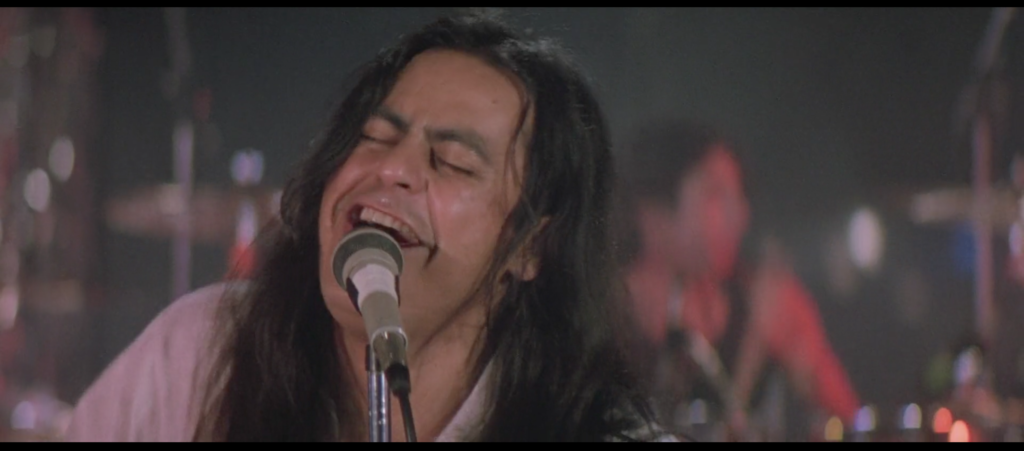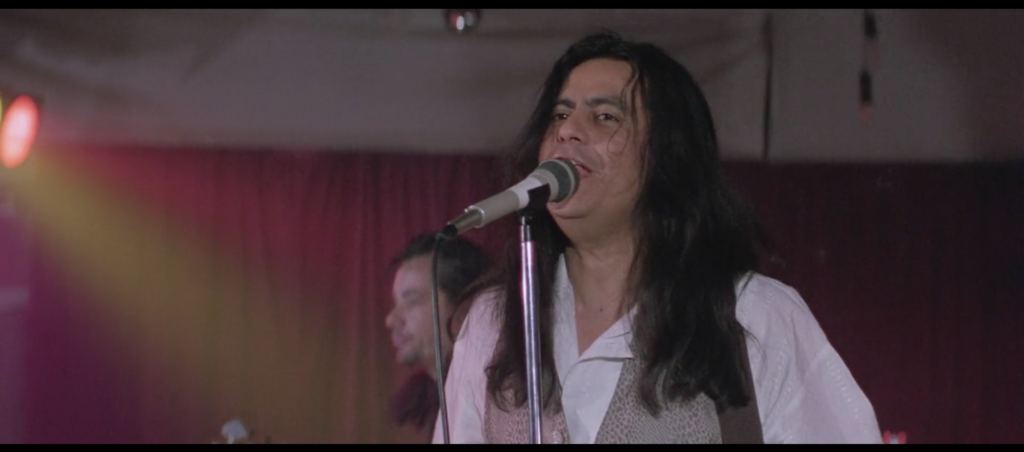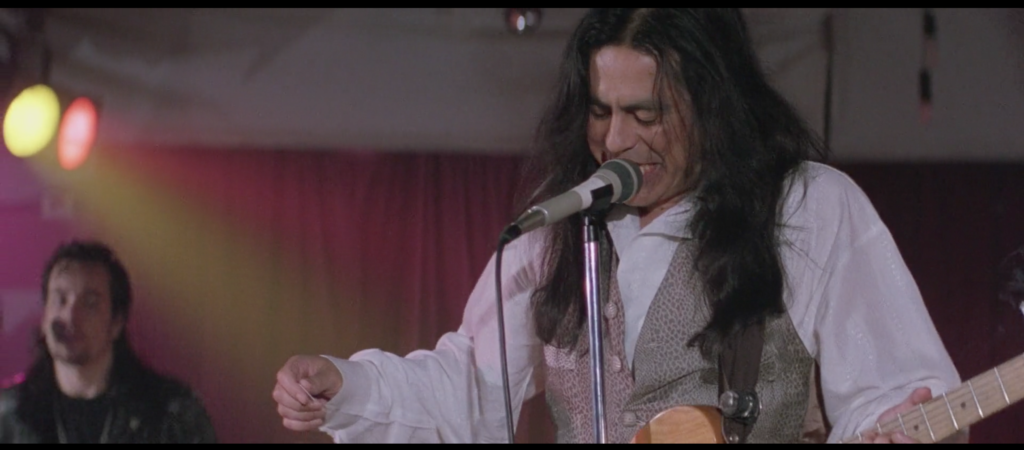The most important thing the opening sequence of Road House wants to convey to you is not to throw stones. “Don’t throw stones,” says the man on stage at the Bandstand. “You don’t know,” he continues. “It’s not what you say, it’s what you do,” he elaborates. He then repeats for emphasis “Don’t throw stones” to conclude his statement.
Why this happens is…ah, one of the great mysteries of Road House, right up there with beginning the film in a bar that is not the titular road house, or even a road house at all.
It’s not like the man singing “Don’t Throw Stones” is Jeff Healey, lead singer of the Jeff Healey Band, who provide the live music in every subsequent scene with live music. He’s Tito Larriva, lead singer of Cruzados, the band playing here, and he’s a pretty interesting cat in and of himself, a human Wikipedia k-hole. He started his musical career as lead singer of the Plugz, an LA punk band from the general Decline of Western Civilization/Love and Rockets milieu who did the original score for Repo Man. Much of the band subsequently morphed into Cruzados, which played up their Latino roots and made a kind of Eighties coke-bloat blooz-rock thing out of it. After their breakup, Larriva eventually formed Tito & Tarantula, who provided the musical accompaniment to the Salma Hayek snake dance in From Dusk Till Dawn. Various members of the Plugz/Cruzados continuum also played with Bob Dylan on Letterman in ’84, the drummer played for Izzy Stradlin & the JuJu Hounds, Social Distortion, and Mike Ness’s solo band, and the bassist has worked with Matthew Sweet for years as well as doing various things with sundry rock and roll legends. How they wound up here has, I assume, something to do with the golden ears of music-industry macher Jimmy Iovine, founder of Interscope, co-founder of Beats by Dre, dater of Stevie Nicks, partial inspiration for “Edge of Seventeen” via his intense grief over the murder of his friend John Lennon, and billionaire, married to Liberty Ross, who’s the sister of Atticus Ross, who’s the songwriting partner of and second-ever official member of Nine Inch Nails with Trent Reznor, who once opened for Izzy Stradlin’s other band Guns n’ Roses and who co-starred with Repo Man‘s Harry Dean Stanton in Twin Peaks: The Return and spent years recording for Iovine’s label Interscope before eventually being named chief creative officer of Beats Music, which became Apple Music after Iovine and Dr. Dre sold it to Apple and became billionaires. It’s a small world after all.
<Al Swearengen voice> Anyways, </> Larriva’s face is the second face you see in close-up in Road House, beaten to the punch only by Kevin Tighe. This is an interesting first foot to put forward, not only because Tighe and Larriva’s looks are <Fifty Shades of Grey meme voice> unconventional </a>, but because Larriva isn’t even in the movie after this first scene. But Road House is a film that plays its cards close to its chest in the early going, primarily because despite the skill of the team of action-movie aces employed to make it look good, it’s written (in part by Academy Award nominee Hilary Henkin) as if the writers were randomly but repeatedly struck on the head during the process, resulting in wild miscalculations of the relative weight of what is shown on screen. The Four Car Salesmen of Jasper, Missouri are one result. Using Frank Tilghman as our entry-point character even though he’s a grinning ghoul in a bolo tie who could only read as more villainous if huffed fumes and said “baby wants to fuck” is another. Centering the whole opening sequence on a band that you’ll never see again is another.
And there is simply no way to overlook or underplay the presence of the band in this sequence, no. They won’t let you. Our first good look at Larriva, in a vest and pirate-look shirt that are striking even given the Road House fashion baseline, involves him screeching, and I mean it sounds like someone just low-blowed him, “IF YOU LOVE ME BUY ME A BIG TEE VEEEEEE” at the top of his lungs and the top of his register. He goes so hard and so high on this he literally stands on tiptoes and sings down into the mic. He coils his face back into his neck like a snake whose strike is sonic rather than physical. This requires effort, and it does not look like a pleasant effort either. So you know, kudos to Larriva and Cruzados. They left it all out on the stage, a stage they were placed on for some reason.
Now when you first watch Road House you may not realize it, but the message espoused by this song will get under your skin. I’ve found myself singing “Don’t throw stones” around the house. I’ve heard my partner doing the same. We’ve used it as shorthand for watching Road House at all, the way couples text “COAT” at each other to find out if they’re going to get laid if they come home instead of staying out with their friends.
What I’m getting at as this: This sequence is superfluous, its content is a non sequitur (not throwing stones is part of neither the Dalton Path nor the Wade Garret Way), the time spent with it is unpleasant, and the lingering impression is endearing. And here’s the thing about that as it applies to Road House, according to J.R.R. Tolkien, author of The Lord of the Rings:
“I cordially dislike allegory in all its manifestations, and always have done so since I grew old and wary enough to detect its presence. I much prefer history – true or feigned– with its varied applicability to the thought and experience of readers. I think that many confuse applicability with allegory, but the one resides in the freedom of the reader, and the other in the purposed dominion of the author.”
Tags: bandstand, cruzados, don't throw stones, if you love me buy me a big tv, it's not what you say it's what you do, j.r.r. tokien, jimmy iovine, music, road house, tito larriva, you don't know



